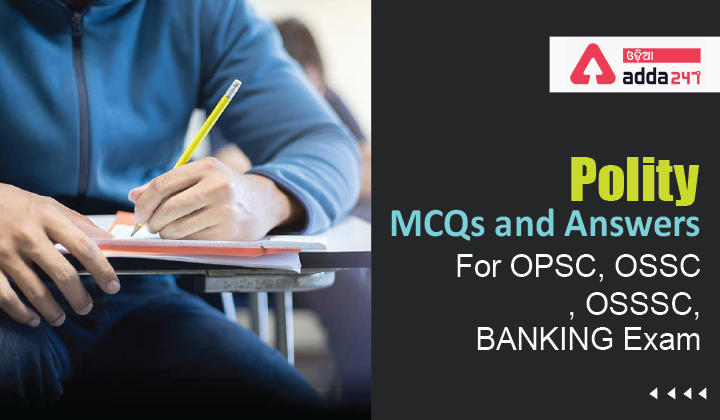Polity MCQs and Answers: Polity MCQs are very important for OPSC, OSSC, OSSSC & Other State Exams. Aspirants who are willing to apply for the various Government exams in 2022 must go through the topics of Polity for competitive exams, as Polity is a key part of the syllabus.
Download ADDA247 Odia APP – Appear Latest Exam Test Series & Live Classes
Q1. Which of the following Articles is related to the Ancillary powers of Supreme Court?
(a) Article 138
(b) Article 140
(c) Article 143
(d) Article 150
S1. Ans.(b)
Sol. Article 140 is related to the Ancillary powers of Supreme Court.
Supreme Court of India
is the supreme judicial authority of India and is the highest court of the Republic of India under the constitution.
Q2. In which of the following Acts of British Parliament, Separate electorate was provided for the Muslims
(a) Government of India Act, 1919
(b) Indian Councils Act, 1909
(c) Government of India Act, 1935
(d) None of these
S2. Ans.(b)
Sol. The Indian Councils Act 1909 commonly known as the Morley–Minto or Minto–Morley Reforms.
It was an act of the Parliament of the United Kingdom thatgrantedseparate electorate for Muslims.
After enactment of this act, Lord Minto, the then viceroy of India, came to be known as “Father of Communal Electorate in India”.
Q3. Who generally presents the Finance Budget in Indian Parliament?
(a) RBI Governor
(b) Budget Minister
(c) Finance Minister
(d) Finance Secretary
S3. Ans.(c)
Sol.
The Union Budget of India, also referred to as the Annual Financial Statement in the Article 112 of the Constitution of India, is the annual budget of the Republic of India.
Q4. A Bill is certified as Money Bill in Lok Sabha by the
(a) Finance Minister
(b) President
(c) Prime Minister
(d) Speaker
S4. Ans.(d)
Sol. The Speaker of the Lok Sabha conducts the business in the house. He/she decides whether a bill is a money bill or not.
Q5. Sixth Schedule of the Indian Constitution provides special administrative provisions in regard to the tribal areas of
(a)Assam, Meghalaya, Tripura and Mizoram
(b)Meghalaya, Assam, Nagaland and Manipur
(c)Tripura, Manipur, Mizoram and Meghalaya
(d)Arunanchal Pradesh, Nagaland, Assam and Tripura
S5. Ans.(a)
Sol. The Sixth Schedule of the Constitution of India allows for the formation of autonomous administrative divisions which have been given autonomy within their respective states.
Presently, 10 Autonomous Councils in Assam, Meghalaya, Mizoram and Tripura are formed by virtue of the Sixth Schedule.
Q6. In the Constitution of India, promotion of international peace & security is included in the
(a) Directive Principles of State Policy
(b) Preamble to the Constitution
(c) Fundamental Duties
(d) Ninth Schedule
S6. Ans.(a)
Sol. Promotion of international peace & security is included in the Directive Principles of State Policyunder Article 51 of constitution.
It describes to promote international peace & security & maintain just an honourable relations between nations; to foster respect for international law & treaty obligations, & to encourage settlements of international disputes by arbitration.
Q7. Which of the folowing Articles of theConstitution of India states that Hindi inDevanagari script shal be the oficial language of the Union?
(a) Article 343(2)
(b) Article 354(2)
(c) Article 343(1)
(d) Article 343(3)
S7. Ans.(c)
Sol. As per Article 343 (1) of the Indian Constitution, The official language of the Union shall be Hindi in Devanagari script.

Q8. Dogri language is mainly spoken in which of the following States/Union territories?
(a) Uttarakhand
(b) Jammu and Kashmir (c) Lakshadweep
(d) Assam
S8. Ans.(b)
Sol.Dogri language is mainly spoken in Union Territory of Jammu and Kashmir.
It is an Indo-Aryan language spoken by about 5 million people in India.
It was added in the 8th Schedule of the Constitution in 2003 through 92nd Constitutional Amendment.
Q9. Which of the folowing government authorites can apoint the Chief Election Commisioner of India?
(a) The Prime Minister
(b) The President
(c) The Vice President
(d) Chief Justice of Supreme Court
S9. Ans.(b)
Sol.The President of India appoints the Chief Election Commissioner of the Election Commission.
They are appointed for 6 years or can work only till the age of 65, whichever comes first.
Q10. The First woman Governor of a State in free India was:-
(a) MrsSarojini Naidu
(b)MsSuchetaKripalani
(c)Mrs Indira Gandhi
(d)Mrs Vijay Lakshmi Pandit
S10. Ans.(a)
Sol. Sarojini Naidu was the first female to become the governor of an Indian state. She governed Uttar Pradesh from 15 August 1947 to 2 March 1949. Her daughter, Padmaja Naidu, is the longest-serving female governor with 11-year tenure in West Bengal.
Q11. Which one of the following statements is NOT true with respect to the Governors?
(a) They are part of the state legislature.
(b)They can forgive the death penalty
(c)They cannot appoint judges of the High Court of the state
(d)They don’t have an emergency Powers.
S11. Ans.(b)
Sol. The correct answer is They can forgive the death penalty.
The Governor is a part of the state legislature under Article 168.
The High Court Judges of the States are administered by the President under Article 217.
The Governor doesn’t have emergency powers like President.
Article 161 gives the Power of the Governor to grant pardons, etc, and to suspend, remit or commute sentences in certain cases.
The Governor of a State shall have the power to grant pardons, reprieves, respites, or remissions of punishment or to suspend, remit or commute the sentence of any person convicted of any offence against any law relating to a matter to which the executive power of the State extends.
But Governor doesn’t have the power to forgive the death penalty.
Q12. Under which Constitutional Article review of Judgements or orders lies with the Supreme Court—
(a) Article 139
(b) Article 137
(c) Article 140
(d) Article 141
S12.Ans.(b)
Sol. Article 137 of Constitution of India – Review of judgments or orders by the Supreme Court Subject to the provisions of any law made by Parliament or any rules made under Article 145, the Supreme Court shall have power to review any judgment pronounced or order made by it.
Q13. Right to Privacy comes under______________.
(a) Article 19
(b) Article 20
(c) Article 21
(d) Article 18
S13. Ans.(c)
Sol. The right to privacy is protected as an intrinsic part of the right to life and personal liberty under Article 21 and as a part of the freedoms guaranteed by Part III of the Constitution.
Q14. Which of the following articles of Indian Constitution empowers the president to appoint Comptroller and Auditor General of India ?
(a) Article 147
(b)Article 148
(c) Article 149
(d)Article 151
S14. Ans.(b)
Sol. Article 148 of Indian Constitution empowers the president to appoint Comptroller and Auditor General of India.
Chapter V under Part V of the Indian Consitution deals with the Comptroller and Auditor-General of India (CAG).
Q15. Total Number of Articles in the Indian Constitution are ?
(a) 395
(b) 396
(c) 398
(d) 399
S15. Ans.(a)
Sol.
Constitiution of India is world’s lengthiest written constitution has 395 articles in 22 parts and 12 schedules.
History MCQs and Answers For Odisha Exam
Reasoning MCQs and Answers For Odisha Exam








